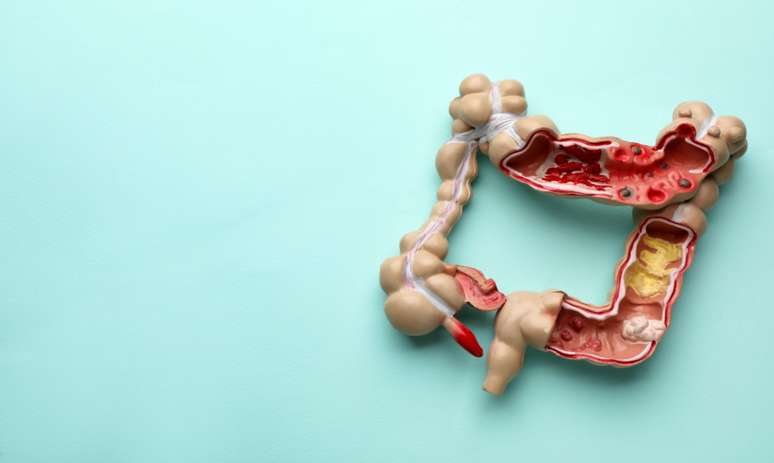The main inflammatory bowel diseases are Crohn’s disease and ulcerative colitis, which have diet as a fundamental part of the treatment.
We’re inside Purple May, awareness month on Inflammatory Bowel Diseases (IBD). According to the Brazilian Society of Coloproctology (SBCP), these conditions affect more than five million people worldwide and their prevalence is increasing in Brazil.
IBD represents a group of immune-mediated inflammatory diseases of the digestive tract. The most common are Crohn’s disease and ulcerative colitis.
According to gastroenterologist Priscilla Huguenin, of Segmedic, inflammatory bowel diseases affect adults, children and the elderly and have seen a significant increase in cases in recent years.
“It is crucial to raise awareness of IBD to promote understanding and support for people affected by these conditions, as well as raise awareness of symptoms and promote early diagnosis,” warns the expert.
Symptoms and causes
According to the gastroenterologist of the Hospital & Clínica São Gonçalo, Eric Pereira, the main symptoms of inflammatory bowel diseases are gastrointestinal. That is abdominal pain, diarrhea, blood in the stool, bloating and weight loss. Additionally, patients may present with general signs such as joint pain, anemia, fever, and eye and skin lesions.
Priscilla points out that symptoms can appear acutely and disappear with treatment or spontaneously, but recur after a period of calm, characterizing them as chronic diseases. “Forms range from mild to severe, with a greater chance of developing colon and rectal cancer,” she warns.
“It is an autoimmune disease, in which the immune system attacks the organism itself and the reason is not yet known. Genetic factors or stress, diet, lifestyle habits, smoking and even excessive protection may be involved in the progression of the disease “, explains Eric.
Diagnosis and treatment
As for the diagnosis, Priscilla clarifies that it is a combination of tests. “The diagnosis of IBD often involves a combination of physical exams, blood tests, imaging tests, colonoscopy, and biopsy,” she explains.
However, according to your doctor, IBD can be difficult to diagnose due to the overlap of symptoms with other gastrointestinal conditions. “Both Crohn’s disease and ulcerative colitis are diseases whose causes are not yet fully understood,” he points out.
Therefore, according to the specialist, there is no proven cure, but only effective treatment. “This happens when you start early and with good specialist monitoring,” explains Priscilla, adding that the treatment is multidisciplinary and involves a gastroenterologist, a nutritionist and, in some cases, a psychologist. “Medications are often prescribed to control inflammation and relieve symptoms.”
Eric also points out that there is a difference between Crohn’s disease and UC. “Crohn’s disease has a different aggressiveness profile, which can affect from the mouth to the anus and also involve all layers of the organs. UC affects only the rectum and large intestine, a little more superficially,” he explains.
Therefore, treatment of Crohn’s disease will always be with drugs that reduce immunity (immunosuppressants), while in UC the need for this class is much less frequent, making the use of an intestinal “anti-inflammatory” drug possible.
Importance of nutrition for inflammatory bowel diseases
IBD patients are at increased risk of nutritional deficiencies and should focus on improved nutrition through dietary supplements. Therefore, it is essential to have a varied diet with good protein quality, with a balance between carbohydrates, fats, vitamins and minerals. In this way, a diet combined with drug treatment helps control seizures.
“The type of food varies greatly depending on whether the individual is suffering from a disease or not, since depending on the affected region, intestinal absorption difficulties may occur, which can worsen, for example, diarrhea. Furthermore, in some cases , the loss of nutrients is so great that the patient can become malnourished,” warns Eric.
Since these are chronic diseases, treatment must be carried out constantly throughout life. Furthermore, it is also important to remember that practicing regular physical activity can help the patient to have a better quality of life, managing not only the symptoms but also the stress generated by the disease.
Source: Terra
Ben Stock is a lifestyle journalist and author at Gossipify. He writes about topics such as health, wellness, travel, food and home decor. He provides practical advice and inspiration to improve well-being, keeps readers up to date with latest lifestyle news and trends, known for his engaging writing style, in-depth analysis and unique perspectives.








